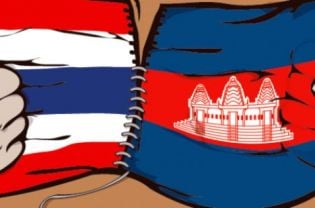 When Yingluck Shinawatra was elected Prime Minister of Thailand this past July, I remarked how this development was likely to ameliorate the tensions which had developed over the years between her country and its neighbor to the east, Cambodia. Between allegations of espionage leveled by Phnom Penh against the government of former Thai Premier Abhisit Vejjajiva, and the recurrent violent military clashes over the ancient temple ruins of Preah Vihear, relations between the two countries seemed to be at their lowest level in years.
When Yingluck Shinawatra was elected Prime Minister of Thailand this past July, I remarked how this development was likely to ameliorate the tensions which had developed over the years between her country and its neighbor to the east, Cambodia. Between allegations of espionage leveled by Phnom Penh against the government of former Thai Premier Abhisit Vejjajiva, and the recurrent violent military clashes over the ancient temple ruins of Preah Vihear, relations between the two countries seemed to be at their lowest level in years.
But no sooner than the time it took for Yingluck to run a proverbial victory lap to celebrate her electoral triumph did Cambodian Prime Minister Hun Sen consequently announce that the election results in Thailand signaled a “new era of cooperation” between the two countries. Relations between Phnom Penh and Yingluck’s brother Thaksin Shinawatra were quite warm, and remained so even after Thaksin’s overthrow when he briefly served as an economic consultant for Hun Sen.
Yingluck’s visit to Phnom Penh last week was the manifestation of the new era. The two heads of state held what has been described by Cambodian Information Minister Khieu Kanharith as a “fruitful” meeting and one in which both parties agreed to a host of bilateral discussions and negotiations on various issues ranging from trade and investment, the border dispute, and the fate of two Thai nationals held in a Cambodian prison on allegations of spying.
Back in Thailand, however, the fighting words coming from the opposition camp of the Democrat Party is evidence that there are still segments of Thailand’s domestic political system which begrudge Hun Sen’s perceived favoritism. “The Cambodian premier is violating the Asean charter by intervening in Thailand’s internal affairs,” said Democrat MP and former Foreign Minister Kasit Piromya. Hun Sen “held a reception for a fugitive instead of cooperating with Thai authorities by bringing that person back to face justice in his own country,” Piromya went on, exemplifying the idea that old hatreds die hard in this part of the world. The fugitive whom the MP is referring to is, of course, Thaksin Shinawatra, who was convicted of graft in absentia in 2008. Thaksin has always contended that the charges against him were politically motivated.
If the Democrats decide to make Yingluck’s foreign policy an issue – especially vis-à-vis Cambodia – they appear to be grasping at straws. The election during the summer was effectively a repudiation of failed neoliberal economic policies favored by the Bangkok elite. But Abhisit’s foreign policy was not particularly effective either; his botched handling of the Preah Vihear dispute was augmented by a ruling by the International Court of Justice which upheld an earlier adjudication that the temple ruins indeed were part of Cambodian sovereignty.
Trounced in an election where the poor, rural majority executed their game plan of class warfare against the ruling elite, the Democrats are now trying to make foreign policy a major issue. If Yingluck’s early success in Cambodia is any indication, this may be an imprudent strategy as well.